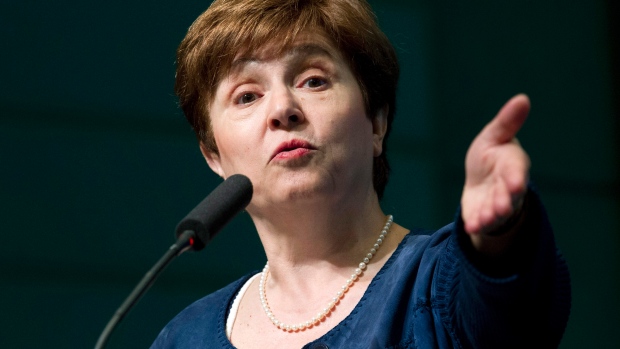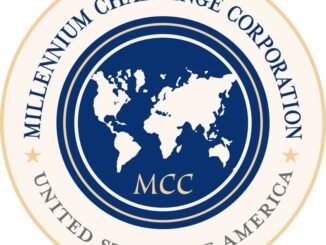
The new leaders of the International Monetary Fund and World Bank warned in twin speeches of a deteriorating global economic outlook, just a week before they will lead the annual meetings of their institutions for the first time.
“The global economy is now in a synchronized slowdown,” said Kristalina Georgieva of Bulgaria, the former No. 2 official at the World Bank, who took the helm of the IMF a week ago.
NEW IMF CHIEF
Her counterpart, David Malpass, a former U.S. Treasury official who became the World Bank’s president in April, offered his own assessment in a speech at McGill University, saying that in June the World Bank had forecast 2.6% global growth in 2019—the slowest in three years—and “we now expect growth to be even weaker than that, hurt by Brexit, Europe’s recession and trade uncertainty.”
Their remarks set the tone for the IMF and World Bank meetings in Washington, where most of the world’s finance ministers and central bankers will be gathering. The new duo, both economists by training, represent a contrast from their predecessors. Christine Lagarde, the former IMF leader, was a lawyer and former French finance minister, while Jim Yong Kim, formerly at the World Bank, was a doctor and former university president.
The global economy they face presents a sharp reversal from two years ago when 75% of the world was accelerating, said Ms. Georgieva, noting that in 2019 the IMF now expects slower growth in 90% of the world and that “the widespread deceleration means that growth this year will fall to its lowest rate since the beginning of the decade.”
Many economists agree that trade tensions loom heavily over the global economy. Ms. Georgieva said that according to IMF research, the cumulative economic loss from the trade war could amount to $700 billion by 2020, or about 0.8% of global gross domestic product.
But the attendees at the IMF and World Bank meetings aren’t the trade officials who could resolve those tensions, and Ms. Georgieva and Mr. Malpass both highlighted the policies that fiscal and monetary authorities could take to boost their economies.
“Trade uncertainty is an important factor in the slowdown,” Mr. Malpass said in an interview with The Wall Street Journal, but “growth could accelerate if the nontrade aspects of this were improved.”
Mr. Malpass highlighted what could be a major policy focus for finance ministers: “If developed countries made changes in their government spending practices that were more pro-growth, and their tax practices were more pro-growth.” For central bankers, he suggested: “Getting to this frozen capital. Understanding why it is that negative interest rates don’t seem to be stimulative becomes an important part of this challenge.”
The economy doesn’t necessarily need to deteriorate further, he said.
“My thought is the slowdown is what’s in the data now,” he said. “The question is what policy changes will be made to change the course of the slowdown.”
For her part, Ms. Georgieva singled out three countries—Germany, the Netherlands and South Korea—as places that could benefit from increasing government spending.
“Our research shows that changes in spending are more effective and have a multiplier effect when countries act together,” she said an event at the IMF’s offices in Washington. “If the synchronized slowdown worsens, we may need a synchronized policy response.”
Courtesy : Wall Street Journal



